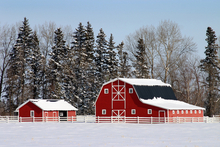As the weather turns cold, many horses are ridden less and less and horse owners become busy with holiday preparations and other activities. This makes it easy to become relaxed in a horse's daily care since they are not being used or seen as often. as during warmer months. However, horses still require much care and attention throughout the winter.

Keeping a healthy barn during cold weather
As the weather turns cold, many horses are ridden less, and horse owners become busy with holiday preparations and other activities; however, horses still require much care and attention.
Here are some tips to help horse owners stay on top of providing maximum health benefits for their charges during winter months when horse related activities may slow down.
- Adjust feeding programs: As pasture quality or accessibility declines consider increasing hay and concentrates.
- Help horses keep warm: Horses kept outside need to eat more forage. Horses produce a lot of heat during digestion. A generous supply of hay helps keep the horse’s internal furnace stoked.
- Add minerals:If your feeding program does not include a mineral supplement consider adding one.
- Have teeth checked: Make sure your horse’s or pony’s teeth are looked after by an equine dentist. The inability to grind food properly will prevent a horse from getting all of the nutrients and energy it needs--especially if energy needs increase during colder weather.
- Prevent snowballs: If snow packs into your horse’s hooves try smearing the bottom with petroleum jelly.
- If you ride frequently: Drying a horse out after a workout is difficult. Consider clipping a heavy hair coat. A clipped horse, without natural insulation, will require stabling and blanketing to keep warm.
- Add insulation: Consider blanketing during wet, very windy, or frigid weather. A wet coat looses its loft--like a wet down jacket, and won’t hold body heat. Windy weather pulls warmth away. Some horses are comfortable during very cold weather; some will be more comfortable in a warm winter blanket.
- Provide shelter: Even if your horses are stabled over night, provide them with a windbreak or shelter especially if you are away most of the day.
- Provide a healthy barn with good ventilation.
- Banish bots: Plan to deworm after the first heavy frost. Use a wormer that includes medication to kill bot larvae.
- Continue deworming: Continue a regular deworming program throughout the winter months.
- Don't let hooves get overgrown: Keep you horse’s hooves clipped. Clipped hooves will chip less, hold less snow, and will provide a bit more grip on slippery ground.
- Check under blankets: If your horse or pony wears a blanket or rug during the winter remove it daily and check for chaffing and irritation. Daily grooming keeps coats cleaner and your horse more comfortable if he wears a blanket.
- Make cleaning frozen water buckets easier: Rubber buckets are easier to knock ice out of if they become frozen. Plastic buckets used as water buckets can shatter when they freeze. This can create a hazard and wastes money when replacing them. Rubber buckets may cost more initially, but last longer.
Learn more about a Healthy Barn
